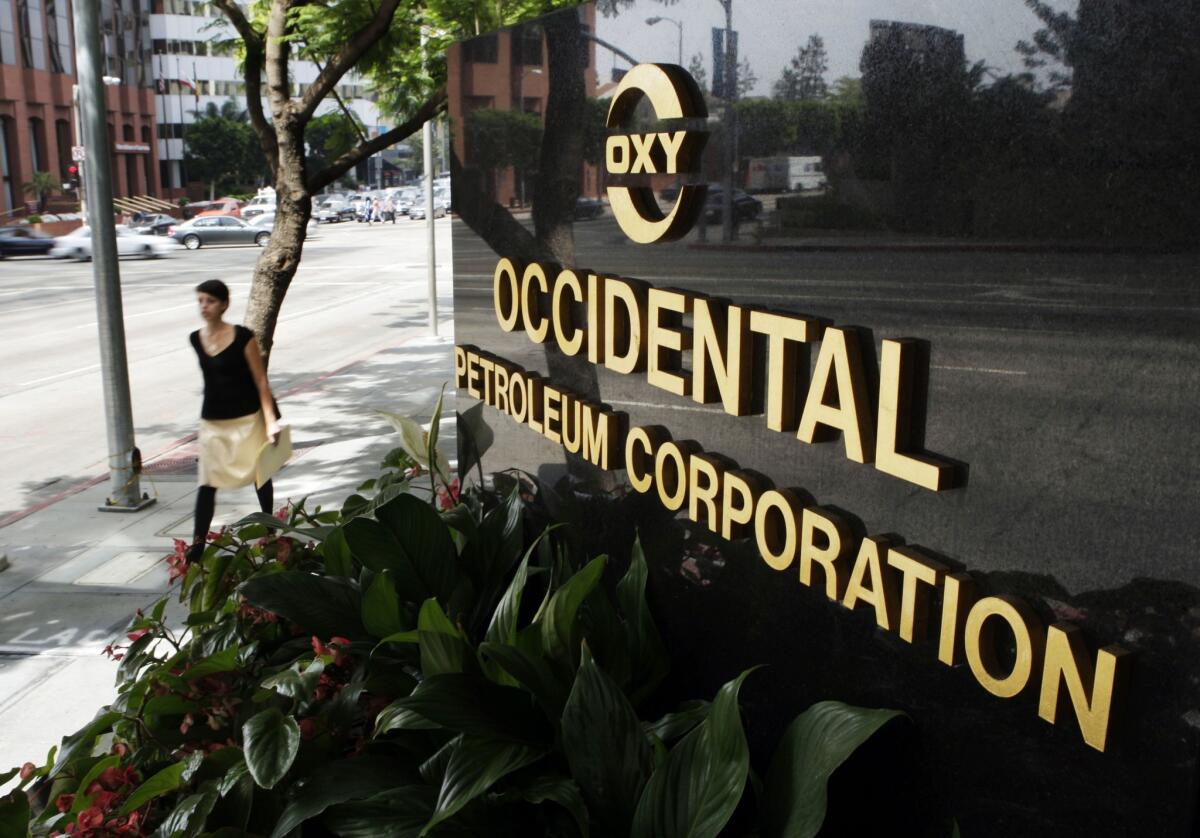Occidental Petroleum to spin off California assets, move to Houston

Occidental Petroleum is ending a nearly century-long run as a storied Los Angeles energy company and moving its headquarters to Houston as part of a corporate overhaul.
The nation’s fourth-largest oil firm also announced plans Friday to spin off its California assets into a separate publicly traded company based in the Southland. Occidental will continue to employ about 8,000 employees and contractors in the state.
The company’s split signals the end of an era for Occidental, which was founded in 1920 and led for many years by oil industry legend Armand Hammer. Oxy, as the company is known, was even involved in far-flung operations such as film production and cattle breeding before eventually becoming an oil giant.
Occidental’s shake-up follows a tumultuous year in which activist investors angry over how the company was run orchestrated a boardroom reshuffle. The company has responded by cutting costs and boosting its share price after falling behind competitors in recent years.
“Creating two separate energy companies will result in more focused businesses that will be competitive industry leaders,” Chief Executive Stephen Chazen said in a Friday statement.
The move to Houston did not surprise some industry watchers, who anticipated the company would want to get closer to its Permian Basin operations in Texas and break off its less productive California unit.
Fadel Gheit, senior energy analyst for Oppenheimer & Co., noted that Chazen bought a house in Houston last year. “California was on the way out,” he said.
Chazen will remain as president and CEO through 2016, extending his time at the helm for two more years, the company said Friday. Chairman Edward Djerejian, who was elected last May, will remain for an additional one-year term.
Along with its Texas assets, the new Houston company will include Occidental operations in Colombia and the Middle East region, as well as the chemical subsidiary OxyChem. The split, which needs regulatory approval as well as a final OK from the board, should be completed by the end of the year or early 2015.
The restructured California company will remain the state’s biggest natural gas producer. The new business will own roughly 2.3 million acres of oil and gas land in the state, and will continue operations in oil and gas basins in areas including Los Angeles and San Joaquin.
Occidental spokeswoman Melissa Schoeb said the new California company will “establish its headquarters in Southern California,” but did not specify whether it would remain in Los Angeles.
The move caps a year of big changes for the company.
Occidental announced plans in 2013 to sell off some stakes in Middle East and North Africa oil fields along with other assets to focus operations closer to home. The shift was intended to streamline its operations and appease investors upset over the company’s stock, which has suffered volatile swings in the last two years.
On Friday, Occidental shares rose $3.49, or 3.8%, to $95.76.
The oil giant’s overall performance sparked a boardroom power struggle last year that pitted Chazen against longtime Chairman Ray Irani. Industry watchers say Irani was angling to push out his former protege and return as CEO. Many shareholders sided with Chazen, and ended up ousting Irani in a dramatic shareholder meeting in May.
David Neuhauser, managing director at Occidental stakeholder Livermore Partners, said recent changes at the company have unlocked greater value for shareholders. Occidental said Thursday that it would sell 1.4 million acres in a Midwestern natural gas field and use part of the proceeds to buy back shares. Dividends were also boosted by 12.5%.
“When all is said and done, it’s going to be a much leaner and more efficient Oxy,” Neuhauser said.
Although some analysts said the company could benefit from a bigger breakup of its assets, others applauded the move as another step in a much-needed corporate revamp.
“It makes sense in streamlining assets, because they are largely in Texas and the Middle East,” said Leo Mariani, a senior analyst at RBC Capital Markets. “It’s better to be in Houston as opposed to in L.A., and you can attract better talent in the global gas and oil capital.”
A split would also allow California to focus just on operations within the state. Investors have been disappointed by the Monterey Shale, a potentially vast source of oil in the Golden State that has so far proved elusive and fallen below expectations.
“It’s really about execution,” Mariani said. “If they can deliver, they can grow California effectively as a stand-alone company.”







